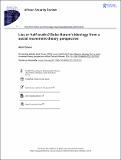Files in this item
Lies or half-truths? : Boko Haram’s ideology from a social movement theory perspective
Item metadata
| dc.contributor.author | Omeni, Akali | |
| dc.date.accessioned | 2022-04-05T16:30:07Z | |
| dc.date.available | 2022-04-05T16:30:07Z | |
| dc.date.issued | 2022-04-05 | |
| dc.identifier | 277319611 | |
| dc.identifier | fc4cfd5c-6f7e-4d6c-98d8-7afb8beabcb4 | |
| dc.identifier | 85129135157 | |
| dc.identifier | 000778466400001 | |
| dc.identifier.citation | Omeni , A 2022 , ' Lies or half-truths? Boko Haram’s ideology from a social movement theory perspective ' , African Security Review , vol. 31 , no. 2 , pp. 174-194 . https://doi.org/10.1080/10246029.2022.2027253 | en |
| dc.identifier.issn | 1024-6029 | |
| dc.identifier.other | ORCID: /0000-0002-2282-6626/work/111210396 | |
| dc.identifier.uri | https://hdl.handle.net/10023/25143 | |
| dc.description.abstract | Using Social Movement Theory (SMT) as a methodological framework and explicitly employing the core SMT concepts of political opportunism and framing, this paper seeks to examine Boko Haram’s use of discourse in activism. As a rarely employed research method within the Boko Haram literature, SMT holds explanatory power around the movement’s approach to transforming motivation potential into actual mobilization via frame resonance. Focusing on the application of framing within (interpreted) sermons, lectures and exhortations by both Muhammad Yusuf and Abubakar Shekau as former substantive leaders of Boko Haram, this paper unpacks the discourse of Boko Haram’s ideology. The paper shows that this ideology, which contrasts the softened core of the Salafist/Wahhabi doctrines from which Boko Haram broke away, relies on problematic interpretations of Qur’ānic exegesis and political thought as both relate to faith and governance in northern Nigeria. One policy recommendation to emerge from this study is that counter-narratives to Boko Haram’s ideology should highlight not just why but also how the group’s rhetoric employs lies and half-truths in an attempt to rationalize its activism; despite what appears to be an adherence to Qur’ānic exegesis, in making its claims. | |
| dc.format.extent | 21 | |
| dc.format.extent | 2772365 | |
| dc.language.iso | eng | |
| dc.relation.ispartof | African Security Review | en |
| dc.subject | Social movement theory | en |
| dc.subject | Framing | en |
| dc.subject | Political opportunism | en |
| dc.subject | Islamic jurisprudence | en |
| dc.subject | Boko Haram | en |
| dc.subject | Ideology | en |
| dc.subject | BP Islam. Bahaism. Theosophy, etc | en |
| dc.subject | JS Local government Municipal government | en |
| dc.subject | T-NDAS | en |
| dc.subject | MCC | en |
| dc.subject.lcc | BP | en |
| dc.subject.lcc | JS | en |
| dc.title | Lies or half-truths? : Boko Haram’s ideology from a social movement theory perspective | en |
| dc.type | Journal article | en |
| dc.contributor.institution | University of St Andrews. School of International Relations | en |
| dc.identifier.doi | https://doi.org/10.1080/10246029.2022.2027253 | |
| dc.description.status | Peer reviewed | en |
This item appears in the following Collection(s)
Items in the St Andrews Research Repository are protected by copyright, with all rights reserved, unless otherwise indicated.

